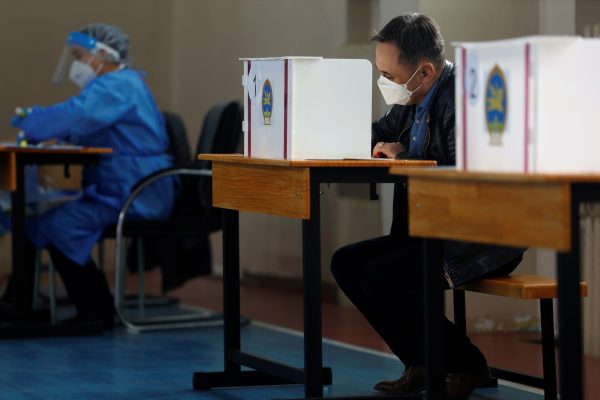Ahead of the June presidential election, Ukhnaagiin Khurelsukh used minor demonstrations against his COVID-19 policies as an excuse to resign as prime minister. In hindsight, it seems clear that this was a strategic decision rather than any contrition about pandemic failures. Khurelsukh was succeeded as prime minister by his cabinet secretary, Luvsannamsrain Oyun-Erdene.
This castling reduced the risk to Khurelsukh that he would be closely associated with any deterioration of the COVID-19 situation and seems to have enabled his resounding victory in the 9 June presidential election.
The run-up to the election brought some democratic fireworks that seem to be turning into a worrisome pattern in Mongolia — someone or some political event crosses a line that raises fundamental doubts about the stability of democracy. In this case, it was claimed by then-president Khaltmaagiin Battulga in April that the country was heading toward one-party rule. Having watched an MPP-dominated parliament with an MPP president, so far, it seems those fears were unfounded and may have said more about Battulga’s reluctance to cede the presidency.
Perhaps of greater concern were shenanigans surrounding fratricidal turmoil in the Democratic Party. A lack of clarity about the legitimate leadership led to a battle over the nomination of a presidential candidate. This delayed the nomination and thus the party’s ability to campaign effectively.
Still, this challenge was largely of the party’s own doing and the result of uncertainty around whether Battulga would be allowed to run for re-election under the 2019 constitutional amendments that limited the presidency to a single term. In the end, the party’s nominee, Sodnomzundi Erdene received the support of less than 7 per cent of voters.
Politically, the most interesting aspect of the presidential election was perhaps the result achieved by Dangaasuren Enkhbat, nominated by the upstart National Labour Party. A tech and social entrepreneur who was a member of parliament from 2008–12, Enkhbat gathered over 20 per cent of the votes. While some dismissed him as a candidate only for urban elites, he received some support across the country, and votes far beyond a small professional class in city districts.
While this suggests some momentum and the possibility of the National Labour Party supplanting the Democratic Party in the long run, the party’s candidate did not come close to winning a majority in parliamentary by-elections in October.
Prime Minister Oyun-Erdene was confirmed as MPP party chair in December and seems firmly focused on his Vision 2050 agenda for comprehensive development and e-government agendas. In the revision of National Determined Contributions ahead of COP26, there emerged a more pointed realisation of the need for more political and regulatory attention to be paid to the climate change emergency. Discussions about the foreseeable end to the coal mining industry have at least begun.
COVID-19 infections continued to drag the economy down, though at least industrial mining was able to resume. The extremely cautious Chinese regime at Mongolia’s border closed the country several times, leading to spikes in prices of consumer goods and some slowdowns in mineral exports, but these were temporary, as was a fuel shortage in late summer. Inflation and persistent poverty remain significant challenges for fiscal and economic policy.
The darkest cloud over Mongolia’s economy has been dissatisfaction with the agreements signed with RioTinto over the giant Oyu Tolgoi mine. An offer in December to write off government debt stemming from a 34 per cent equity stake in the project seemed to receive an enthusiastic welcome from the MPP and suggests that negotiations might progress at pace.
Like much of the world, Mongolia is watching closely to see whether the US–China rivalry develops into a bipolar situation that would leave the country at risk of being forced to pick sides between its instinctive affinity with democracies and its total economic dependence on China. Fortunately, President Khurelsukh has indicated his focus on international relations through his attendance at the UN General Assembly, suggesting that this area of policy-making that had languished under Battulga will receive significant attention. One option is for Mongolia to tilt even further toward the UN, something that a proposed peacekeeping training centre might accomplish.
Given the political constellation of an MPP president and prime minister, and settled party leadership, 2022 is likely to be a politically calm year that might lead to some implementation of the many development plans the Vision 2050 foresees, especially if a reconfirmed agreement for the Oyu Tolgoi mine makes long-term fiscal prospects more secure. COVID-19 will continue to threaten Mongolia’s economic development, challenging the recovery of its tourism industry, but possibly also spurring further growth in agricultural production.
Julian Dierkes is Associate Professor at the University of British Columbia’s School of Public Policy and Global Affairs. He is one of the principal authors of the Mongolia Focus blog.
This article is part of an EAF special feature series on 2021 in review and the year ahead.

